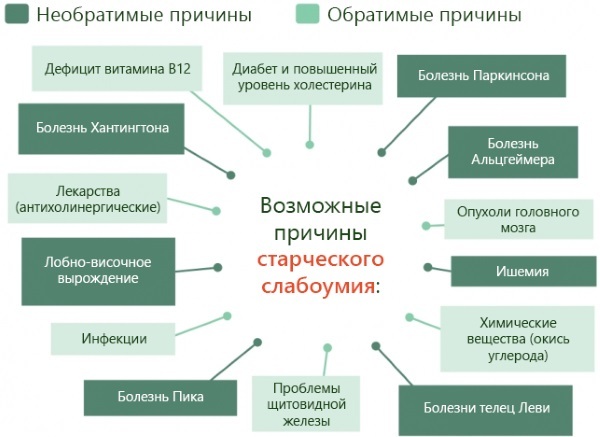Amnesia - this is a memory disorderassociated with the loss of information about any event or period of time. A similar condition can occur against the background of various reasons in any person, regardless of his age.
Loss of memories that preceded traumatic brain injury (TBI), mental impairment of consciousness, unconsciousness, an attack of a neurological disease, traumatic shock - this is a retrograde amnesia. That is, a person in such situations loses memory only about events that occurred a few minutes or hours before the appearance of the cause.
Treatment for the problem aims to eliminate the root cause, stimulate and improve brain function. To restore memory, psychotherapy and medications are used.
Record content:
- 1 Views
- 2 Stages and degrees
- 3 Symptoms
- 4 Reasons for the appearance
- 5 Diagnostics
- 6 When to see a doctor
- 7 Prevention
-
8 Treatment methods
- 8.1 Organic nature
- 8.2 Psychogenic nature
- 9 Possible complications
- 10 Amnesia video
Views
Retrograde amnesia is memory loss over a period of time. It can be several minutes, hours, or even years.
There are several types of retrograde amnesia:
- time-graded;
- focal;
- dissociative (psychogenic).
Types of retrograde amnesia:
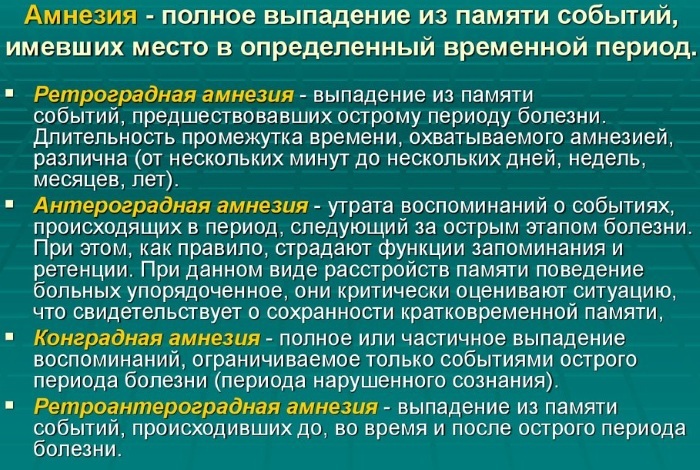
| Type of amnesia | Description | Signs |
| Temporarily Graded Retrograde Amnesia | As a rule, retrograde amnesia is always timed, the latest information is affected, and memories of the past usually remain. In medical practice, this condition is defined as Ribot's law. The severity of memory impairment varies, with some having memory loss for the previous day, others for a year or more. But with all this, the memories of childhood and adolescence are preserved. |
|
| Focal retrograde amnesia | In medicine, it is called pure or isolated memory loss. It proceeds with mild signs of anterograde amnesia. |
|
| Dissociative (psychogenic) retrograde amnesia | The appearance of this type of problem is preceded by an emotional shock. That is, memory loss is a psychological response to severe emotional trauma. The victim could be a witness to the crime or be a participant in the violence himself. It is considered a temporary phenomenon, after the restoration of the psycho-emotional background, memory returns. |
|
Stages and degrees
While in the elderly, amnesia is associated with vascular disorders and degenerative processes, in young people, amnesia is facilitated by psychological and traumatic events.
All causes in medicine are divided into two groups:
- psychological;
- organic.
Organic causes are associated with morphological, metabolic, bioelectrical disorders of the cerebral structures of the brain.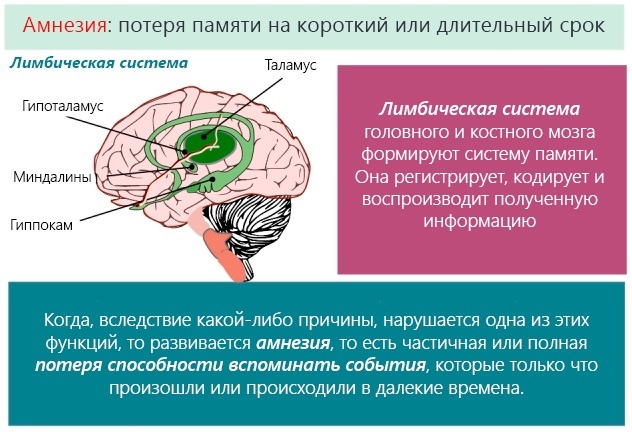
Organic reasons:
| Organic causes | Description of the signs of amnesia |
| Traumatic brain injury (TBI), including concussion or contusion | The events that immediately preceded the injury are lost from memory. Amnesia is temporary. |
| Neoplasms in the brain | Amnesia appears against the background of compression and death of neurons. |
| Cerebral hypoxia | The consequence of hypoxia is the death of nerve cells and interneuronal connections. It develops against the background of circulatory disorders in the brain (stroke), respiratory failure, asphyxia in case of carbon monoxide poisoning. |
| Neuroinfection (tick-borne encephalitis, meningitis with suppuration) | Amnesia occurs as a result of an infectious lesion of the cerebral tissues. |
| Intoxication | Toxic damage to brain cells provokes temporary memory loss. As a rule, the events that occurred during the period of intoxication are erased. Toxic provocateurs are drugs, alcohol, drug overdose, pesticide or chemical poisoning. |
| Degenerative disorders of the central nervous system (Pick and Alzheimer's disease, vascular dementia) | Memory loss is caused by atrophy, demyelination, and neuronal death. |
| Epilepsy | Amnesia appears only during the attack. |
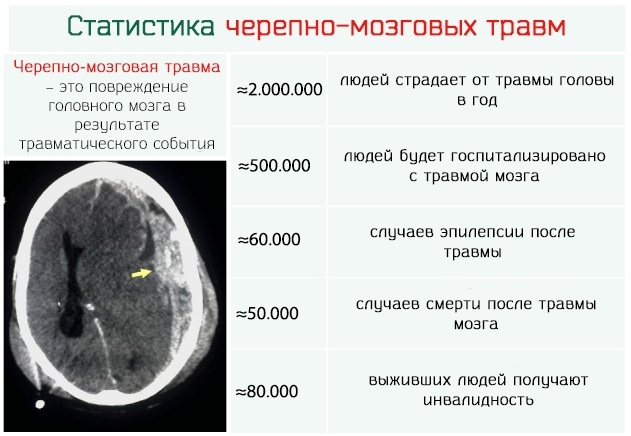
By the nature of the manifestation, amnesia is classified:
- acute form - appears suddenly after a head injury, injury, stroke, intoxication, encephalitis and other diseases that disrupt the work of individual structures of the brain;
- growing - amnesia gradually increases, the patient loses more and more time from memories, a similar condition is characteristic of disorders of the nervous system, the presence of tumors, mental violations.
The psychological group of the causes of amnesia does not affect the brain pathologically, it is exclusively an effect on the psyche:
- psychological trauma (death of a loved one, violence, accident, military events, etc.) - amnesia in this case is a kind of defensive reaction;
- mental disorders - temporary amnesia, can occur with dissociative personality disorder, schizophrenia, hysterical state.
According to the degree of memory loss, amnesia is classified:
- complete - absolute loss of information over a certain period of time;
- partial - vague images and scraps of information remain for the period of time lost memory;
- local - limited memory loss of certain skills and abilities (appears against the background of psychogenic factors).
By the nature of the course, the following types of amnesia are distinguished:
- regressive - memory is gradually returned by separate events or information;
- stationary - there is no memory state dynamics;
- progressive - amnesia progresses, memories of more past events are erased, and information about the present is lost.
According to Ribot's law, a sequence of events is noted. Memory is lost in this order: first, the facts of the nearest past are erased from memories, and the memory of older events is gradually lost. The memory is restored in the reverse order.
With memory damage after strokes, signs of amnesia are combined with signs of hypomnesia (loss of memory of real events), paramnesia (interweaving of memories of the present and the past), impaired motor ability and disorders speech.
Symptoms
Retrograde amnesia is the inability to remember events that preceded the cause (trauma or severe psychological distress). The victim forgets how he ended up in the place where he regained consciousness and with whom he recently communicated. The person is completely disoriented in space and time.
Concomitant signs are a difficult perception of information, this state can continue indefinitely. The victim asks the same question for several days or weeks in a row. After a while, memory may return, but the very reason that attracted such a problem, the person may not remember.
Depending on the underlying cause, the patient may have associated symptoms:
- with epilepsy - convulsions;
- with schizophrenia - hallucinations;
- with alcohol or drug intoxication - delusional statements, physical disorientation;
- in violation of blood circulation in the brain - fainting, dizziness, speech disorder;
- with head injuries - dysfunctions of the cardiovascular and respiratory systems.
Reasons for the appearance
Retrograde amnesia is the result of dysfunction of certain structures of the human brain that are responsible for emotional state and memory. These departments include the thalamus (center of the brain), hippocampus (temporal lobe of the brain). There are several factors that can cause amnesia.
Causes of retrograde amnesia: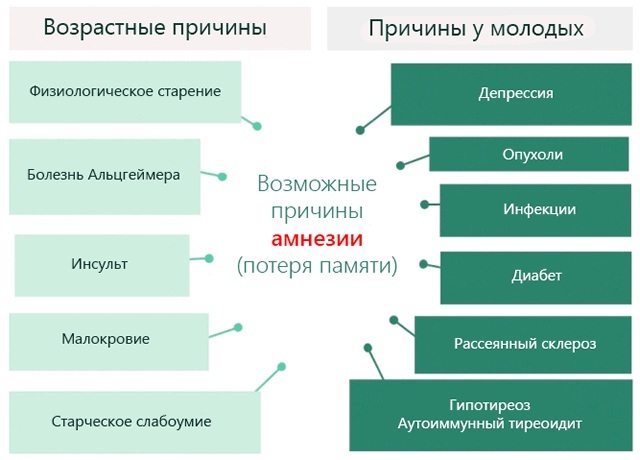
| Cause | Description |
| Mechanical trauma to the brain | With mild and moderate injuries, the victim has a concussion without memory loss. But in the event of serious injury, such as a severe blow to the head from a fall from a height or being struck by a heavy object, the part of the brain responsible for storing information is damaged, which leads to amnestic syndrome. Amnesia can be temporary or absolute, depending on the severity of the injury. |
| Lack of thiamine | A lack of thiamine in the body can be triggered by regular alcohol consumption or severe malnutrition, all of which lead to the development of Wernicke's encephalopathy. Without treatment, the disease results in Korsakoff's psychosis, represented by anterograde and retrograde amnesia. |
| Encephalitis | Viral brain damage, in particular the Herpes virus. In addition, the pathology can be triggered by an autoimmune reaction that appears against the background of cancer. The inflammatory process in the tissues of the brain affects the departments responsible for storing memories. |
| Alzheimer's disease | This pathology and other degenerative mental disorders gradually lead to the appearance of retrograde amnesia. There is no treatment for such pathologies in medicine.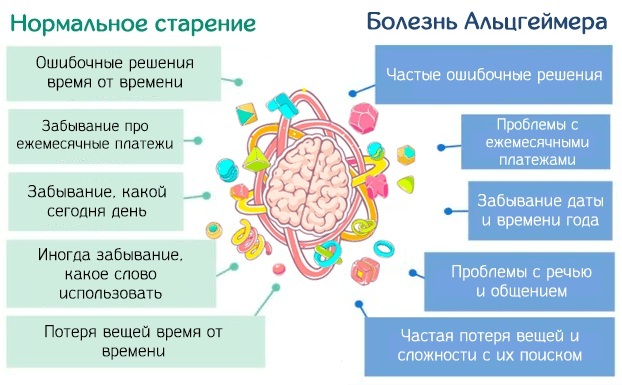
|
| Stroke | A stroke can affect verbal and visual memory, as well as parts of the brain responsible for storing memories of past events. As a result, amnestic retrograde syndrome develops, but in addition to this, the victim of a stroke may develop dementia. |
| Epileptic seizures | Seizures of any type, including epileptic seizures, can cause irreparable damage to the brain, resulting in memory loss. Sometimes the entire brain is affected, and sometimes only a small part of it, usually the temporal and frontal lobes. |
| Heart failure | Cardiac arrest is accompanied by respiratory arrest for a while, which means that brain cells do not receive oxygen during this period. As a result, the departments that are responsible for memory are damaged. |
Diagnostics
Retrograde amnesia is a consequence of any serious psychological shock or severe head injury, therefore, the diagnosis is made individually, taking into account the clinical manifestations. Patients are consulted by a neurologist, a psychiatrist with the involvement of other specialists, such as an infectious disease specialist, a neurosurgeon and a narcologist.
A set of diagnostic measures: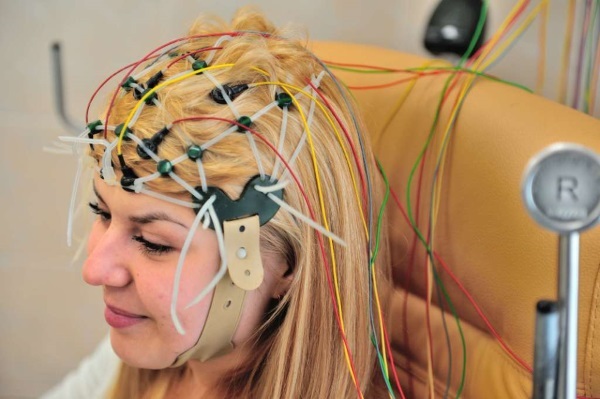
| Diagnostic procedure | Description |
| Taking anamnesis | Interviewing the victim and his family about previous events. |
| Neurological analysis | Allows you to find out the symptoms of organic pathology of the central nervous system and determine the degree of post-traumatic injuries. |
| Mental health analysis | It is necessary for psychogenic amnestic syndrome and mental disorders. |
| Evaluation of cerebral hemodynamics | It is carried out if there is a suspicion of memory impairment associated with vascular genesis. For mild disorders, rheoencephalography is prescribed, for a more informative study - USDG of the vessels of the brain, MRI and duplex scanning. |
| Study of the structures of the brain | For TBI and intracranial hematomas, CT is performed. To determine tumor formations, post-stroke foci, processes of tissue degeneration, cerebral MRI will be more informative. |
| Electroencephalography | It is carried out in case of epileptic seizures, it allows to identify the paroxysmal activity of the brain and its course. |
| Cerebrospinal fluid analysis | It is prescribed for suspicions of an infectious origin of damage to the structures of the brain, as well as for intracranial hemorrhage. |
| Biochemistry blood test | The presence of toxic substances in the blood and the concentration of vitamin B1 are detected. |
When to see a doctor
Amnesia is a complete and long-term memory loss, but retrograde, unlike other forms of manifestation of this problem, is temporary. At the same time, the ability to communicate, cook food, do the usual everyday things remains unchanged.
Therefore, the signs of such a condition are sometimes difficult to recognize immediately, but close people will definitely pay attention to any changes in the victim's behavior. At the first suspicion of memory impairment, you should contact a neurologist who will determine the root cause and in the future will be sent for appropriate examination and consultation to other narrow-profile specialists.
An alarming signal can be:
- short-term memory lapses;

- the patient forgets about the stressful situation that caused the problem, he experienced;
- confusion of recent events is noted;
- disorientation in time;
- poorly assimilates new information;
- forgets about where he is and why he came to this or that place.
In order to somehow fill the void in the memory, the patient begins to come up with explanations and believe in them. It is often difficult even for loved ones to notice serious changes in behavior in time. Treatment of retrograde amnesia should be started as soon as possible, because lost time threatens with serious disorders in the brain and the development of Korsakov's syndrome.
Prevention
Unfortunately, it is impossible to prevent brain injury, these situations can arise unexpectedly and not for their own reason. But you can avoid the development of retrograde amnesia triggered by a brain disease or alcohol intoxication.
For this you need:
- regularly undergo routine medical examinations, take tests and undergo hardware diagnostics of pathologies associated with the central nervous system;
- with caution and rational use of alcoholic beverages;
- follow the daily routine, adhere to proper nutrition;
- take vitamin complexes during the off-season;
- observe safety precautions at work and when doing household work.
Treatment methods
There are no specific medications for treating retrograde amnesia; the goal of therapy is to eliminate the root cause and restore lost brain function. For example, if amnesia is associated with epileptic seizures, then doctors will take treatment to reduce the number of seizures.
For amnesia caused by Alzheimer's disease and degenerative mental impairment, drugs are used to suppress the progression of the underlying disease. In addition, such patients require constant care and support from loved ones.
Under other circumstances, the cause of the development of amnestic syndrome is found out, and therapy is carried out in accordance with the results of the diagnosis and the existing clinical picture. Timely treatment started can completely restore the information lost by the brain. In the case of an organic origin of amnesia, drug tactics are used, with a psychogenic nature, psychotherapy is prescribed.
Organic nature
Amnesia of organic nature (with TBI, bruises, concussion, strokes, etc.) is treated mainly in dosage forms, sometimes it is required to restore a mental state psychotherapy.
Medicines used to treat organic amnesia.
| Drugs | Name | Action |
| Vasodilator drugs, antiplatelet agents | Actovegin, Curantil | They enhance the supply of nutrients to the brain tissue, improve blood circulation in small vessels. |
| Neuroprotectors, antioxidants | Glycine, Ginkgo Biloba, Mexidol, Tocopherol | They stimulate the metabolism of neurons, increase their resistance to oxygen starvation and other negative influences. |
| Anticholinesterase drugs | Proserin, Galantamine hydrobromide, Armin | They prevent the progression of degenerative dementia, increase physical activity. They are widely used in the diagnosis of Alzheimer's disease. |
| Antagonists | Memantine | They enhance mnestic abilities, are effective in Alzheimer's disease. |
| Nootropics | Piracetam, Cerebrolysin, Semax | They stimulate metabolic processes in cerebral tissues, restore and activate cognitive functions. Eliminate nervous and mental disorders, restore the parts of the brain responsible for memory. |
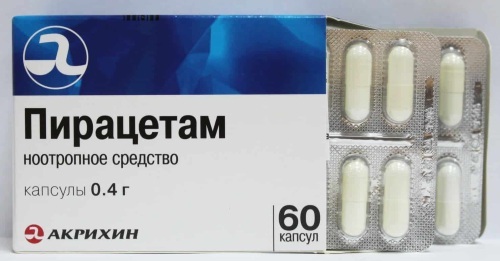
B vitamins are prescribed as additional agents; they are effective in combination with adaptogens and microelements. The most harmless and effective plant-based adaptogenic preparations.
This is:
- tincture of Chinese lemongrass;
- eleutherococcus;
- tincture of ginseng.
Psychogenic nature
Psychotherapy is aimed at adapting the patient to the existing gaps in memory. In some situations, doctors use hypnosis. The goal of treatment of psychogenic forms of amnesia is the patient's acceptance of the fact that there are no memories for a certain period of time. Treatment is carried out by a psychiatrist.
In the complex, therapy is based on the following techniques:
- Psychotherapy. The development of a new attitude by the patient to the existing memory problem through cognitive-behavioral treatment. Psychoanalysis of the past is also used, which allows the patient to reconsider his attitude to the current situation, which entailed memory problems.
-
Creative therapy. A similar tactic is used for patients who close in their thoughts, do not show their emotions and feelings in public, but when this they feel a strong emotional shock from what happened, the technique is also effective for children and persons with mild signs dementia. The therapy is carried out through art therapy, fairy tale therapy, and more.

- Medication. When using psychotherapy, medication is prescribed in the complex. Taking sedatives, vitamins, neuroprotectors, antagonists, sedatives and antidepressants can improve the state of depression, mental disorders, anxiety. Medical treatment is determined individually, depending on the existing problem.
Possible complications
The complexity of the course and outcome of the problem is closely related to the etiology and degree of damage to the corresponding structures of the brain. But even despite a mild degree of amnesia, patients may experience great difficulties in relations with the outside world, it all depends on the psychological state and support of loved ones.
Complications are possible from cognitive disorders:
- weakening of memorization of new information;
- speech impairment;
- reading problems;
- weakening of the function of thinking and reproduction of information.
If memory loss is associated with vascular pathologies, it is possible to add cerebral symptoms:
- dizziness;
- headache;
- high fatigue;
- darkening in the eyes.
Temporary memory loss is retrograde amnesia that occurs suddenly due to injury brain, concussion, bruise, stroke, diseases affecting the work of individual structures brain. There is one advantage in this difficult problem - with timely treatment, there is a high chance of memory recovery. For this purpose, medication and psychotherapy are used.
Amnesia video
Doctor about acute memory loss - amnesia:



